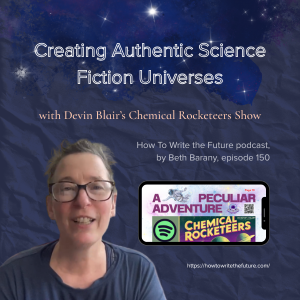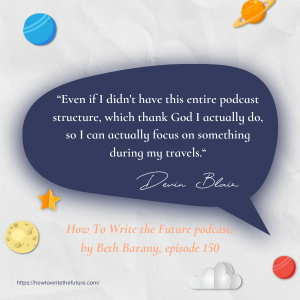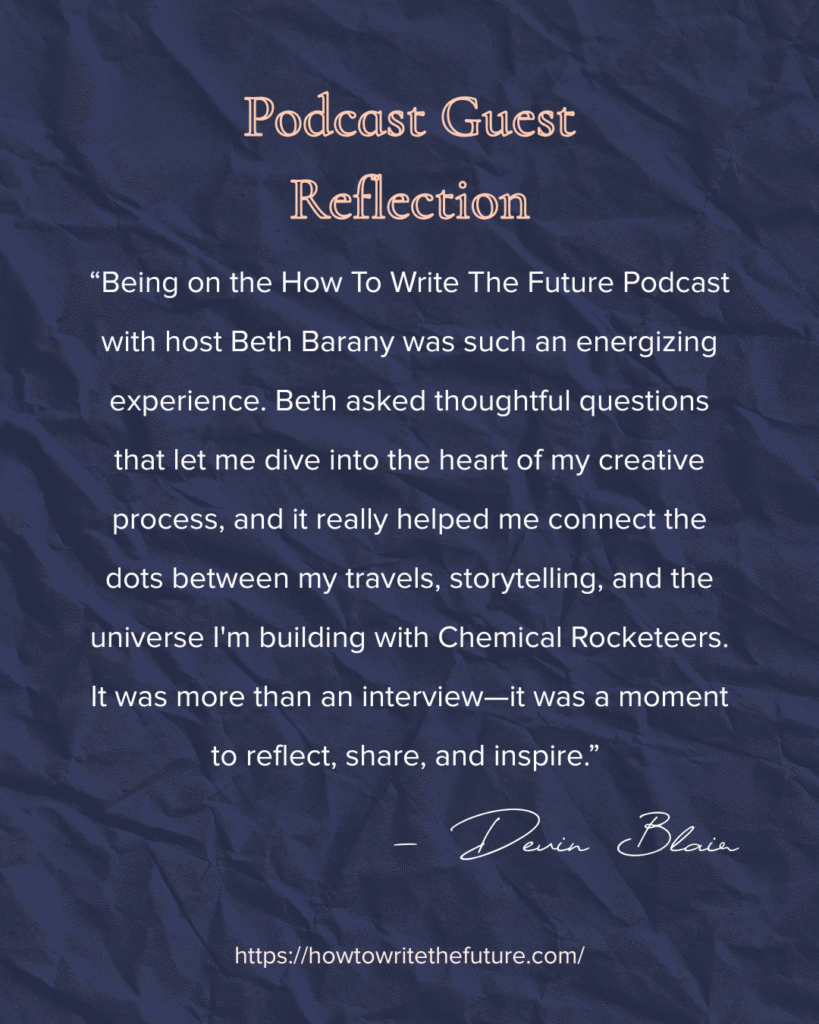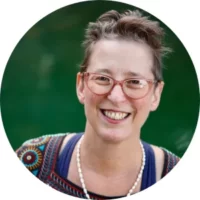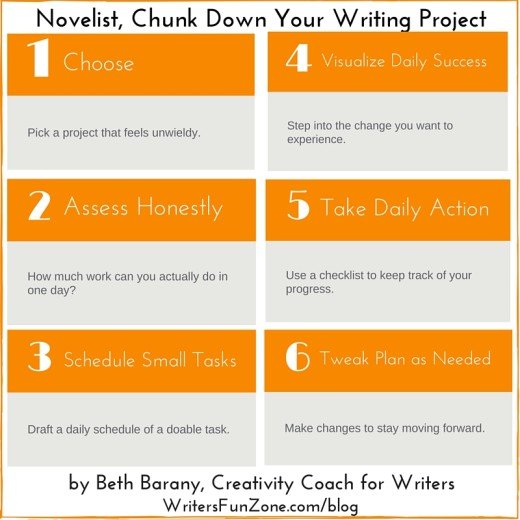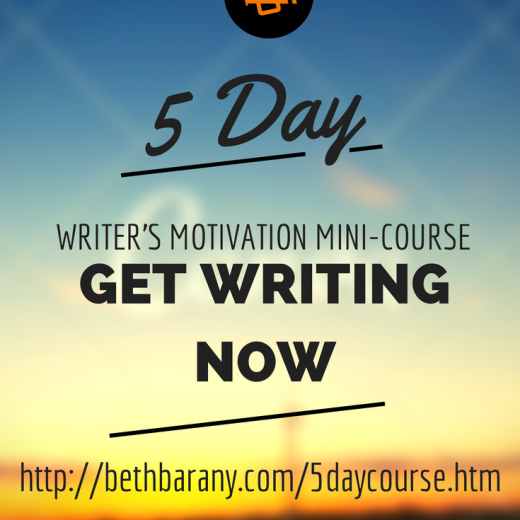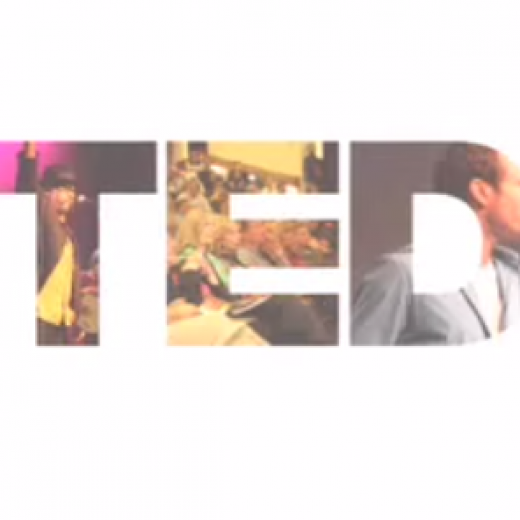Creating Authentic Science Fiction Universes with Devin Blair’s Chemical Rocketeers Show
Creating Authentic Science Fiction Universes with Devin Blair’s Chemical Rocketeers Show – How To Write the Future podcast, episode 150
***
“Even if I didn’t have this entire podcast structure, which thank God I actually do, so I can actually focus on something during my travels.“ – Devin Blair
In this episode of How To Write the Future, host Beth Barany talks to Devin Blair, the creator of the sci-fi podcast Chemical Rocketeers. Together they discuss Devin’s current adventures in Afghanistan and why traveling is everything to him. They also share the challenges in world building and the influence travel can have on your creativity.
“Being on the How To Write The Future Podcast with host Beth Barany was such an energizing experience. Beth asked thoughtful questions that let me dive into the heart of my creative process, and it really helped me connect the dots between my travels, storytelling, and the universe I’m building with Chemical Rocketeers. It was more than an interview—it was a moment to reflect, share, and inspire.” — Devin Blair
Platforms The podcast is available on Apple Podcasts | Buzzsprout | Spotify | Podcast Addict | Amazon Music| YouTube
RESOURCES
GET HELP WITH YOUR WORLD BUILDING – START HERE
Free World Building Workbook for Fiction Writers: https://writersfunzone.com/blog/world-building-resources/
Sign up for the 30-minute Story Success Clinic with Beth Barany: https://writersfunzone.com/blog/story-success-clinic/
Get support for your fiction writing by a novelist and writing teacher and coach. Schedule an exploratory call here and see if Beth can support you today: https://writersfunzone.com/blog/discovery-call/
About the How To Write the Future podcast
The How To Write The Future podcast is for science fiction and fantasy writers who want to write positive futures and successfully bring those stories out into the marketplace. Hosted by Beth Barany, science fiction novelist and creativity coach for writers. We cover tips for fiction writers. This podcast is for readers too if you’re at all curious about the future of humanity.
This podcast is for you if you have questions like:
– How do I create a believable world for my science fiction story?
– How do I figure out what’s not working if my story feels flat?
– How do I make my story more interesting and alive?
This podcast is for readers too if you’re at all curious about the future of humanity.
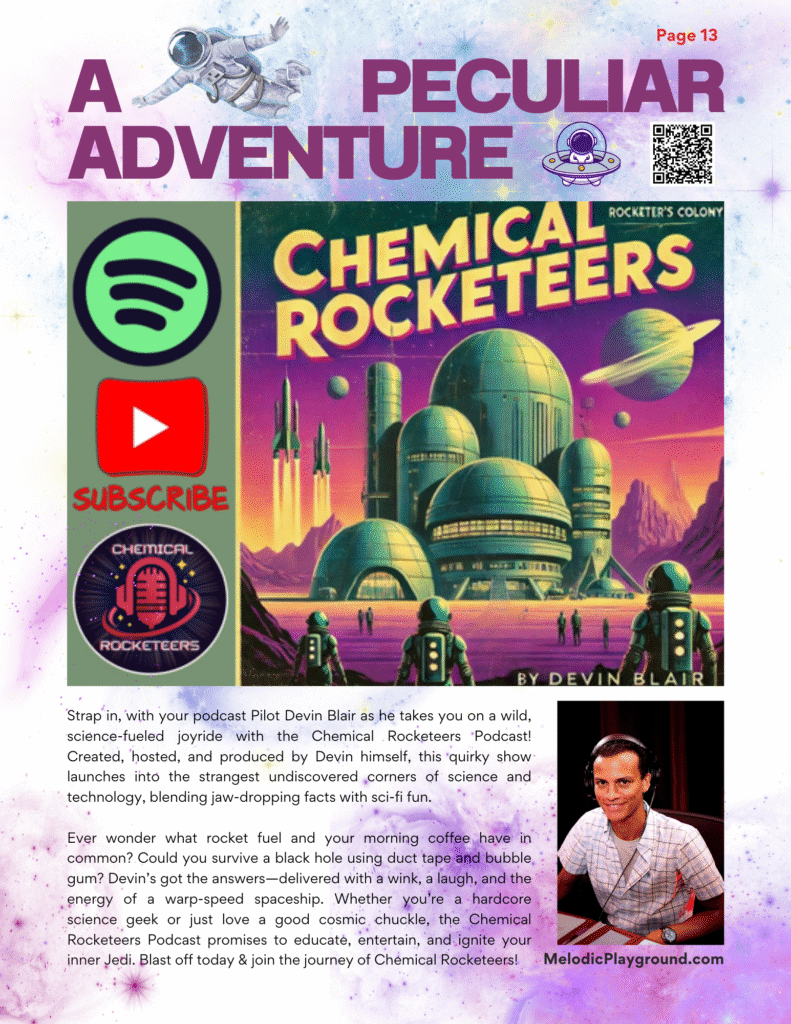
About Devin Blair
Devin Blair is the creator of Chemical Rocketeers, a sci-fi podcast that blends immersive storytelling, real-world inspirations, and futuristic themes of exploration, survival, and emergence. Drawing from his travels and background in Chemical Engineering Technology, Devin crafts a richly detailed universe where factions battle for survival, technology meets mysticism, and history shapes the future. Through podcasting, field reports, and multimedia storytelling, he builds an ever-expanding sci-fi universe that connects with fans on multiple levels.
LinkTree: https://linktr.ee/chemicalrocketeers101
Facebook: https://www.facebook.com/profile.php?id=61566804364795
Instagram: https://www.instagram.com/chemicalrocketeers101/
LinkedIn: https://www.linkedin.com/in/devin-blair-8a625a206
YouTube: http://www.youtube.com/@ChemicalRocketeers
Transcript for Creating Authentic Science Fiction Universes with Devin Blair’s Chemical Rocketeers Show
[00:00] Introduction
Welcome to How to Write the Future Podcast. I’m your host, Beth Barany. I’m an award-winning science fiction and fantasy writer. Also a creativity coach, book editor, book consultant, and oh yeah, what else? Filmmaker. More about that later.
[00:16] Guest Introduction: Devin Blair
So today, really excited to bring with you a multi-passionate, multi-talented creative: Devin Blair.
Devin is coming into the recording today from Afghanistan. Devin Blair is the creator of Chemical Rocketeers, a sci-fi podcast that blends immersive storytelling, real world inspirations and futuristic themes of exploration, survival, and emergence. Drawing from his travels and background in chemical engineering technology, Devin crafts a richly detailed universe where factions battle for survival technology meets mysticism and history shapes the future. Through podcasting field reports and multimedia storytelling, he builds an ever expanding sci-fi universe that connects with fans on multiple levels.
Welcome Devin. I’m so excited to have you here. Really interesting project that you’re up to. Welcome.
An honor and pleasure. Thank you so much for having me on the platform.
[01:21] Devin’s Current Adventures in AfghanistanReally glad you’re here. And as we were getting organized, everyone, for this interview, you were emailing me from Dubai, and now you’re in Afghanistan.
[01:31] Traveling and World Building
Can I ask what is it that you’re doing? Are you just traveling, sightseeing, visiting friends, doing work? What are you up to?
Yes, that’s actually a really good question. I was actually formally invited when I was actually networking around, Dubai to find a way to have my best tour going around for Afghanistan. ’cause Afghanistan’s not really a place that you just go and solo tour unless you actually know places but I actually hit up a group that tours for Afghanistan. and so I hit them up and then I had my visa and letter of invitation made up while I was in Dubai.
And so now I’m in Afghanistan at the guest house, getting ready for my tour for this week.
That’s quite an opportunity. Alright, let’s dive into our interview.
[02:10] Challenges in World-Building
Can you tell me what are some of the key challenges in building a post-apocalyptic yet hopeful future, in fiction?
Yes. So basically balancing the grit with growth and having to show the damage, but also the drive to rebuild, which actually takes the Rocketeers, colony where they actually have to rebuild humanity. And in the Rocketeers universe, it’s also trying to show you even in the ruins, the unity and curiosity as the mission becomes bigger than survival itself. ‘Cause this is basically the upbringing of humanity trying to be rebuilt. They go explore. It’s not even just about loss, it’s also what could be created next.
So, it, the audio is a little bit choppy .There’s some kind of apocalypse that has happened and humanity is trying to rebuild?
Yeah, so the story goes on planet Earth. Basically there’s a nuclear catastrophic event happens, and right before it does happen, the secret organizations on the governments, which I haven’t fully explained just yet, which I’m still working the story out for seasons, which it will be further explained in the future seasons, they basically sent this colony that’s selected by the organizations to a distant planet to rebuild humanity, and they have to start from scratch from there.
Okay, cool.
[03:23] Influence of Travel on Creativity
And so how does traveling really influence your approach to world building and character development?
Even if I didn’t have this entire podcast structure, which thank God I actually do, so I can actually focus on something during my travels. But it even comes with different cultures and everything else. even just redefine your character and actually making you more well deserved, so basically traveling is everything for me when I’m actually pursuing this project. And for every country, for every person I meet it can actually find me some elements. I can actually find ways to write my characters. You know, it makes them more feel real. Sometimes it can be an event, sometimes it can be a location and a culture experience. It just really sparks something. It’s like a festival throughout event or even throughout the country itself. Even exploring the ruins in Italy could shape up a mission setting or how I can pull elements from each country and a visit and mixing the right ingredients based on culture history.
That’s a big one. History. The vibe check even settle out to build factions, characters, environments, it’s all about balancing one with another while staying consistent in my world building.
Yeah, consistency is key. And you emphasized in your bio, you emphasized history and now again you emphasize history. Tell me more about how history is helping you shape your story.
This actually comes from a future episode that I don’t wanna spoil too much because it hasn’t been released yet because it’s still in the production. But this takes about back in like World War I, where we actually talk about the technology of the uprising and all that kind of stuff.
And that can actually spark an interest in one of the countries I’ve been through. So take for example, throughout Europe where they had the crusaders but it also takes from the technology and just mixing up the right ingredients from a faction that can be built from the Crusaders and they can be built into World War I technology. Yeah, I totally understand. And especially that time period is very, very rich, in terms of inspiration.
So what advice do you have for aspiring science fiction and fantasy writers who are trying to create immersive universes?
Yes, that is a very important question. It’s not even an answer for everyone because maybe not everyone has that kind of opportunity, because you can have a really big idea for your case and ideas can be very important, there’s kind of two biggest pillars.
You have to create something lasting authentic consistency. And you can have a strong vision of what you’re building.
It’s more like focusing on something that feels to you laying down a solid foundation from a core theme to world logic and tone and growing it piece by piece.
More like a slow and steady race ’cause I mean, it’s not really like a race to get to because something your life’s passion. You keep track of everything, stay present in the creative flow and commit to showing up very regularly.
That’s how immersive universe stays strong.
[06:04] Engaging the Audience Beyond Storytelling
Really fun. Can you share some insights on how you’re engaging your audience beyond just storytelling? You mentioned branding, interactive content, or other ways that you are engaging with your audience beyond the podcast itself.
Yes, that is another great question for that case. It has actually leaned into, number four, which actually for me, it’s about crafting a full circle experience rooted in- we talked about the two pillars about consistency and being authentic. I didn’t wanna like butcher the word ’cause sometimes I could be a little struggling about that. It’s actually collaborating, networking, and showcasing the work on my different platforms so people can hear and see it and feel the Rocketeers’ universe. ‘Cause even for the two platforms I use the most for my work is Facebook and Instagram, which is for the art and the written storytelling while YouTube and Spotify and similar podcast, platforms are more audio experiences where you hear the main episodes. So when you hear about season one and the main episodes,and when you actually read the reports on Facebook and when you read the field reports, those are actually the side missions. I actually explained the lore between season one and season two. And the goal is to make it feel like you’re stepping right into the action. Like you’re actually watching, you watch your favorite movie like Indiana Jones and you’re like, oh, snap, I’m actually, it feels like I’m in there. Or it feels like I’m actually getting bull whipped by Indiana Jones himself. You know what I mean? And like each piece just feels like it’s flowing to the next and building something bigger together.
I really love that because, for myself as a writer, I write reports, telegrams, telegraphs, phone conversations, memos, sayings, quotes. But a lot of that exists in backstory. And then I use some of it in the fiction, in the novels that I make, and now I’m moving into filmmaking and television and I’m also developing those kinds of things.
And that’s very inspiring to remember to use– some people call it interstitial material– that doesn’t necessarily end up in what we consider the final product, but actually is fabulous for interacting with our audience. So really, really fun that you’re doing that.
[08:07] Devin’s Background and Career Shift
Give us a plug for where we can find Chemical Rocketeers.
Oh yeah, you can basically find anywhere you can search Chemical Rocketeers and boom, there you go.
Excellent. And I’ll be sure to put all those links in our show notes, which will be on our blog, YouTube, all the podcast outlets, and then we market all over the socials, so we’ll definitely be spreading the word for you.
[08:29] Final Thoughts and Farewell
Is there anything else that you would like our audience to know? And our audience are mostly writers, science fiction and fantasy writers.
Anything that you’d like them to keep in mind as, as a parting thought?
If there’s probably one more thing I can add into it, it’s probably always had a cross collab with other people and all that kind of stuff because it can actually- with two sparking minds, it can actually make a lot more, better ground.
Yeah. Cross collaboration. That’s wonderful. That’s so great. Well, Devin, I wanna thank you so much for taking your time and your world travels so awesome. I’m saying hello to you from the San Francisco Bay Area, and you’re all the way there in Afghanistan. Stay safe and thank you so much for being on How To Write The Future.
It’s an honor. Thank you so much.
All right everyone. That’s it for this week. Write long and prosper.
Devin Blair Podcast Reflection
Loved this episode? Leave us a review and rating here: https://www.buzzsprout.com/2012061
Need instructions on how to leave a review? Go here.
***
ABOUT BETH BARANY
Beth Barany teaches science fiction and fantasy novelists how to write, edit, and publish their books as a coach, teacher, consultant, and developmental editor. She’s an award-winning fantasy and science fiction novelist and runs the podcast, “How To Write The Future.”
Learn more about Beth Barany at these sites:
Author site / Coaching site / School of Fiction / Writer’s Fun Zone blog
CONNECT
Contact Beth: https://writersfunzone.com/blog/podcast/#tve-jump-185b4422580
Email: beth@bethbarany.com
LinkedIn:https://www.linkedin.com/in/bethbarany/
IG: https://www.instagram.com/bethbarany/
TT: https://www.tiktok.com/@bethbarany/
FB: https://www.facebook.com/bethbarany
X: https://twitter.com/BethBarany
CREDITS
- EDITED WITH DESCRIPT: https://www.descript.com?lmref=_w1WCA (Refer-a-Friend link)
- MUSIC CREDITS : Music from Uppbeat (free for Creators!): https://uppbeat.io/t/soundroll/fuzz-buzz License code: UMMKDRL02DFGKJ0L. “Fuzz buzz” by Soundroll. Commercial license: https://musicvine.com/track/soundroll/fuzz-buzz.
- DISTRIBUTED BY BUZZSPROUT: https://www.buzzsprout.com/?referrer_id=1994465 (Refer-a-Friend link)
- SHOW PRODUCTION BY Beth Barany
- SHOW CO-PRODUCTION + NOTES by Kerry-Ann McDade
C 2025 BETH BARANY
For more “How To Write the Future” episodes, go here.
If you’d like to invite Beth onto your podcast, drop her a note here.
✅ Like the work we do? Tip us! https://ko-fi.com/bethbarany

